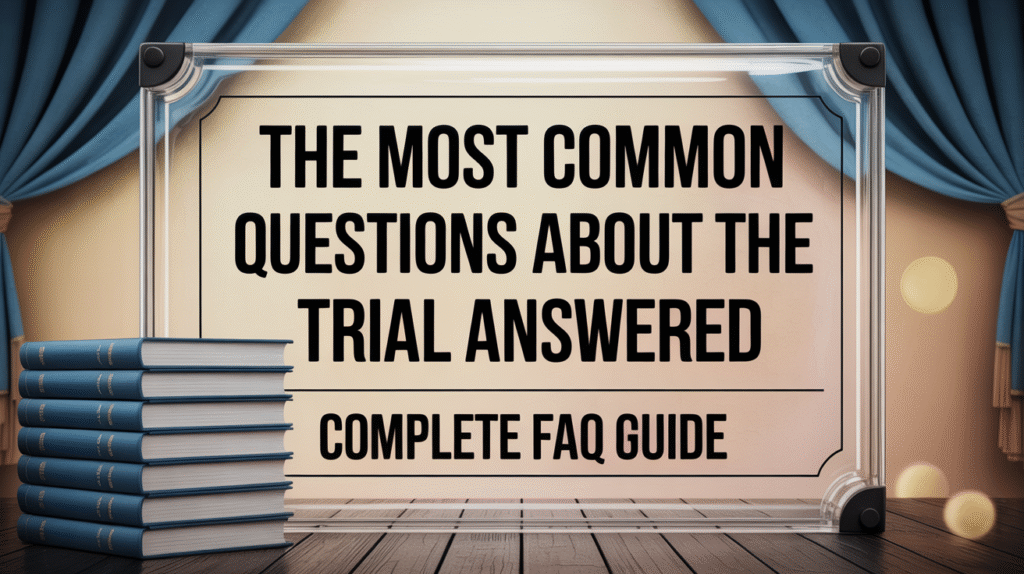Readers often leave Franz Kafka’s The Trial with more questions than answers. Why was Josef K. arrested? What does the court represent? And what is the meaning of the novel’s disturbing ending? The best way to approach Kafka’s masterpiece is to confront these questions directly. Below is a comprehensive FAQ guide that addresses the most common queries and explains what readers most want to know.

Why Was Josef K. Arrested?
Kafka never reveals the reason for Josef K.’s arrest. This omission is deliberate and central to the novel’s message.
No stated crime
The absence of a clear charge highlights the absurdity of a legal system that operates without transparency.
- Guilt in the novel is not tied to actions but treated as an inherent condition.
- The arrest shows how power can function without justification.
Thematic purpose
By refusing to name the crime, Kafka forces readers to confront the possibility that guilt and judgment are universal human conditions.
Who or What Does the Court Represent?
The court in The Trial is both specific and symbolic.
Bureaucratic authority
On the surface, it represents sprawling institutions that enforce rules but never explain them.
- Officials, clerks, and judges embody faceless processes.
- Procedures replace justice, showing how systems of power perpetuate themselves.
Metaphysical interpretation
The court also symbolizes higher, inaccessible truths.
- Some readers view it as a metaphor for divine judgment.
- Others see it as Kafka’s commentary on human existence itself—endlessly scrutinized, never resolved.
What Is the Meaning of “Before the Law”?
The parable “Before the Law” appears in Chapter 9 and offers a condensed allegory of the novel’s central themes.
The parable’s lesson
A man waits outside the door of the Law his entire life, only to be told at death that the door was meant for him alone.
- It represents the perpetual deferral of access to truth or justice.
- The man’s obedience to authority becomes his downfall.
Connection to the novel
Josef K. mirrors the man from the country—always seeking, never attaining clarity. The parable highlights the futility of waiting for permission from authority that thrives on delay.
Why Does the Novel End With “Like a Dog”?
Josef K.’s last words at his execution are perhaps the most haunting line in the book.
Symbol of humiliation
Crying “Like a dog!” shows K. recognises his death is not just violent but degrading.
- The court strips him of dignity, reducing him to less than human.
- Shame, rather than death, becomes the final punishment.
Wider meaning
Kafka suggests institutions do not simply kill or control people—they rob them of their humanity through humiliation and internalised shame.
What Is the Role of Women in The Trial?
Female characters play ambiguous and often unsettling roles in K.’s journey.
Women as intermediaries
Many women are connected to court officials and offer help through intimacy or influence.
- Their aid is conditional and often comes at personal cost.
- Desire and authority become intertwined, blurring personal relationships.
Symbolic role
They highlight how personal and private life is absorbed into the machinery of bureaucracy, leaving no space untouched.
Is The Trial About Religion, Politics, or Existentialism?
Interpretations vary, and the novel deliberately resists one single explanation.
Religious reading
The court may represent divine judgment, inaccessible and mediated by endless gatekeepers. Josef K. is like humanity itself—sinful without knowing why.
Political reading
The novel anticipates the rise of totalitarian states where citizens are subject to arbitrary surveillance, arrest, and punishment.
Existential reading
Seen existentially, The Trial reflects the human search for meaning in an indifferent universe. The absence of a crime mirrors the absence of inherent meaning in life.
Why Does Kafka Leave So Much Ambiguous?
The lack of closure is not a flaw but the essence of Kafka’s writing style.
The power of uncertainty
Kafka uses ambiguity to keep the reader in the same position as Josef K.—confused, anxious, and powerless.
- Ambiguity mirrors the structure of bureaucratic systems.
- It forces readers to engage actively with interpretation.
Literary innovation
This refusal to resolve meaning is one reason Kafka is regarded as a pioneer of modernist literature.
FAQs: What Readers Most Want to Know About The Trial
Here are some common questions and answers about Franz Kafka’s The Trial.
What is the main message of The Trial?
The novel warns about the dehumanising effects of opaque authority. It shows how systems of power can strip away dignity, create guilt without cause, and enforce compliance through shame and delay.
Is Josef K. innocent?
On a literal level, Josef K. never learns his crime and therefore appears innocent. Symbolically, however, Kafka suggests guilt is universal and inevitable, part of the human condition.
Why does the court never explain itself?
The court thrives on ambiguity. By withholding explanation, it sustains its power. Once rules are clear, they can be challenged; Kafka shows how opacity ensures control.
What genre is The Trial?
The novel is a blend of modernist literature, absurdist fiction, and existential allegory. It combines realistic detail with dreamlike sequences that feel both logical and nightmarish.
Why is The Trial still relevant today?
Its exploration of surveillance, bureaucracy, and arbitrary authority resonates with modern concerns about technology, government power, and faceless institutions that affect people’s lives.
Key takeaway: Kafka’s The Trial is deliberately enigmatic, filled with unanswered questions that mirror its themes of guilt, bureaucracy, and power. By addressing the most common reader questions, we see how Kafka crafted a story that feels timeless in its critique of authority and its unsettling portrayal of the human condition.
